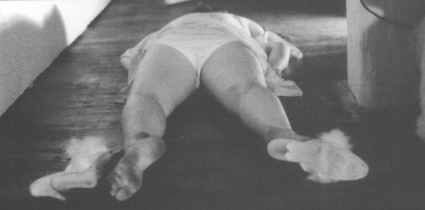Navigating dark spaces
John Conomos

Uncle Bill, CD-ROM, Debra Petrovitch
Debra Petrovich’s new CD-ROM Uncle Bill is an engrossing, multilayered work that explores, with thematic and formal inventiveness, questions dealing with childhood memories, sexual abuse, social class and space. Petrovich’s distinctive, foreboding soundtrack presages its Gothic narrative of sexual violence, industrial chaos and repression. Set in Wollongong in the 1960s with the ‘satanic mills’ of BHP’s steelworks, Uncle Bill’s opening macroscopic aerial focus of Petrovich’s childhood neighbourhood and its subsequent microscopic zoom into the intimidating spaces of a home, set the right frame of dramatic action for the user to navigate the work.
Uncle Bill displays a subtle use of still, moving and scrolling illuminated text images accompanied by pulsating images of a child threatened by drunken men sporting air rifles. Bored teenagers and leather-clad bikies milling around milk bars on their bicycles and motorbikes sometimes give Uncle Bill a Kenneth Anger look. Footage of crashed cars and roadside victims evoke a JG Ballard undercurrent. As we navigate the rooms and corridors of the home, the industrial sounds of Wollongong are a perfect aural metaphor for the traumas of a child in the care of sadistic, loveless people.
Uncle Bill’s powerfully raw images and sounds form a stark, resonant work with aesthetic, cultural and formal roots in various feminist video and new media traditions exemplified by artists Lynne Hershman, Joan Jonas, Laurie Anderson, Dara Birnbaum, Sadie Benning and Carole Schneeman. The violent treatment of a child is acutely rendered by the recurring motifs of her playing in a tub of water and the frequent abrasive sounds of a barking dog (off-space). Both motifs underline Uncle Bill’s chilling mise-en-scene of child sexual abuse.
In a tour-de-force section of the work, a collage of structured scrolling text attests to Petrovich’s strong visual and sound instincts as an artist/narrator. Her graphic multimedia skills and unswerving motivation to create form out of chaos is ideally suited to the expressionist treatment of this subject matter. The CD-ROM genre suits Petrovich’s atmospheric collage style of techno-creativity. As we follow our own navigational instincts, we can immediately experience the overpowering sense of “no escape” from the violent domestic and industrial cacophony that surrounds Petrovich’s child protagonist.
The ugliness of the suburban-industrial landscape of the CD-ROM provides an apt metaphor for domestic violence. However, Uncle Bill is not a thesis—it does not set out to prove a point—but instead it reveals a tragic assemblage of ideas, gestures and atmospheres that vividly telegraph to us the traumatic horrors of child sexual abuse.
Ideally because of the expressionist stylistics used in Uncle Bill, it would be better exhibited as an installation (as it was at Artspace, Sydney in August). It is a large, bold and atmospheric work notable for its omnidirectional thematic and formal concerns around an issue central to our individual and social psychic lives.
Despite initial scepticism in certain quarters, CD-ROM is thriving in this country and overseas. Uncle Bill is an innovative, experimental contribution to the expanding definition of the genre.
Uncle Bill, written and directed by Debra Petrovich; interface designer Wade Marynowsky; producer Julianne Pierce, CD-ROM 2000.
RealTime issue #40 Dec-Jan 2000 pg. 20






